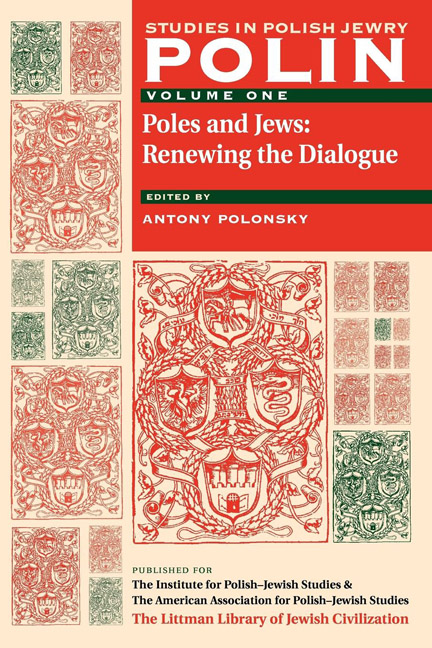Book contents
- Frontmatter
- Dedication
- Editors and Advisers
- Contents
- Polin
- Statement From the Editors
- ARTICLES
- The Reconstruction of Pre-Ashkenazic Jewish Settlements in the Slavic Lands in the Light of Linguistic Sources
- Jewish Perceptions of lnsecurity and Powerlessness in 16th-18th Century Poland
- Some Basic Characteristics of the Jewish Experience in Poland
- The Changes in the Attitude of Polish Society Toward theJews in the 18th Century
- Eros and Enlightenment: Love Against Marriage in the East European Jewish Enlightenment
- Polish-Jewish Relations and the January Uprising: The Polish Perspective
- Loyalty to the Crown or Polish Patriotism? The Metamorphoses of an Anti-Polish Story of the 1863 Insurrection
- The Polish Revolt of 1863 and the Birth of Russification: Bad for the Jews?
- A Turning Point in the History of Polish Socialism and its Attitude Towards the Jewish Question
- The Question of the Assimilation of Jews in the Polish Kingdom (1864-1897): An Interpretive Essay
- The Secular Appropriation of Hasidism by an East European Jewish Intellectual: Dubnow, Renan, and the Besht
- Some Methodological Problems of the Study of Jewish History in Poland Between the Two World Wars
- Jews and Poles in Yiddish Literature in Poland Between the Two World Wars
- Is There a Jewish School of Polish Literature?
- The Underground Movement in Auschwitz Concentration Camp
- DOCUMENTS
- INTERVIEW
- A DIALOGUE
- BIBLIOGRAPHICAL ESSAYS
- BOOK REVIEWS
- CONTRIBUTORS
Polish-Jewish Relations and the January Uprising: The Polish Perspective
from ARTICLES
- Frontmatter
- Dedication
- Editors and Advisers
- Contents
- Polin
- Statement From the Editors
- ARTICLES
- The Reconstruction of Pre-Ashkenazic Jewish Settlements in the Slavic Lands in the Light of Linguistic Sources
- Jewish Perceptions of lnsecurity and Powerlessness in 16th-18th Century Poland
- Some Basic Characteristics of the Jewish Experience in Poland
- The Changes in the Attitude of Polish Society Toward theJews in the 18th Century
- Eros and Enlightenment: Love Against Marriage in the East European Jewish Enlightenment
- Polish-Jewish Relations and the January Uprising: The Polish Perspective
- Loyalty to the Crown or Polish Patriotism? The Metamorphoses of an Anti-Polish Story of the 1863 Insurrection
- The Polish Revolt of 1863 and the Birth of Russification: Bad for the Jews?
- A Turning Point in the History of Polish Socialism and its Attitude Towards the Jewish Question
- The Question of the Assimilation of Jews in the Polish Kingdom (1864-1897): An Interpretive Essay
- The Secular Appropriation of Hasidism by an East European Jewish Intellectual: Dubnow, Renan, and the Besht
- Some Methodological Problems of the Study of Jewish History in Poland Between the Two World Wars
- Jews and Poles in Yiddish Literature in Poland Between the Two World Wars
- Is There a Jewish School of Polish Literature?
- The Underground Movement in Auschwitz Concentration Camp
- DOCUMENTS
- INTERVIEW
- A DIALOGUE
- BIBLIOGRAPHICAL ESSAYS
- BOOK REVIEWS
- CONTRIBUTORS
Summary
In the sixth decade of the nineteenth century a revised stereotype of the Jew began to gain ground in Polish literature. Novels such as J. I. Kraszewski's Metamorfozy (Metamorphoses) and Choroby wieku (Ills of the Age), J. Korzeniowski's Krewni (The Relatives) and J. U. Niemcewicz's Rok 3333 (The Year 3333) emphasized the Jews’ increasing involvement in the expanding capitalistic economy and the modernization of their way of life. Literary treatment of Jews was marked by its focus on the upwardly mobile assimilated strata of Jewish society and those Jews’ increasingly visible identification with the Polish world. This latter emphasis - which not accidentally coincided with the renewal of interest in Frankism - indicated that the Polish society's readiness to integrate the assimilating Jews might have natural limits.
These main trends could not easily be reversed by the short period of Polish-Jewish brotherhood which occurred in the early 1860s. However, the upheavals of the insurrectionary period considerably delayed their growth by shifting public attention to other dimensions of Polish-Jewish interaction. In 1862, Gazeta Warszawska, the same newspaper that three years earlier had launched the so-called ‘Jewish war’, a press-campaign against the Jewish bourgeoisie of Warsaw, exemplified the new, more positive inter-ethnic climate when it urged its readers to show more zeal in collecting money for gifts to the city's synagogues. The literature echoed resoundingly with this change in the prevailing mood due to Jewish participation in patriotic manifestations and continuing Jewish support for Poles during the uprising. One of its characteristic expressions was a flood of poetical manifestos and prayers exalting the idea of Polish-Jewish brotherhood, an alliance seen as an element of a broader vision of national reconciliation. The account that literature gives of the changing perceptions of Jews in the early 1860s is, of course, not free of internal contradictions, in regard to both the nature and intensity of this change in mood. Both ideological and geographical factors should be taken into consideration when interpreting such literary treatments. It is immediately apparent that this literature overemphasizes the depth and irreversibility of these changes in attitudes and also focuses attention on Warsaw, the centre of the real and mythical events and where the Jewish legend first took shape.
- Type
- Chapter
- Information
- Poles and Jews: Renewing the Dialogue , pp. 68 - 80Publisher: Liverpool University PressPrint publication year: 2004

